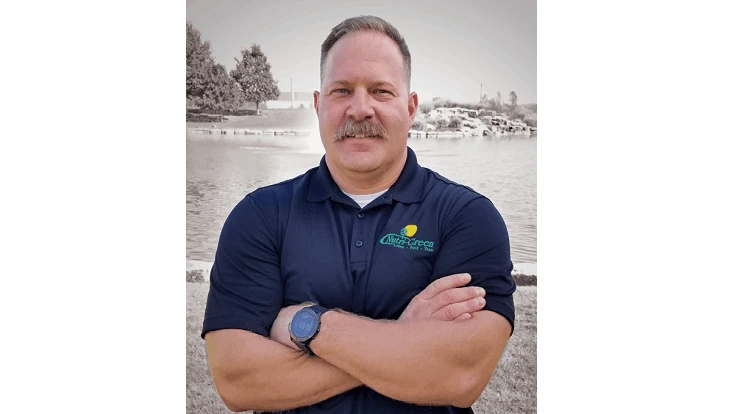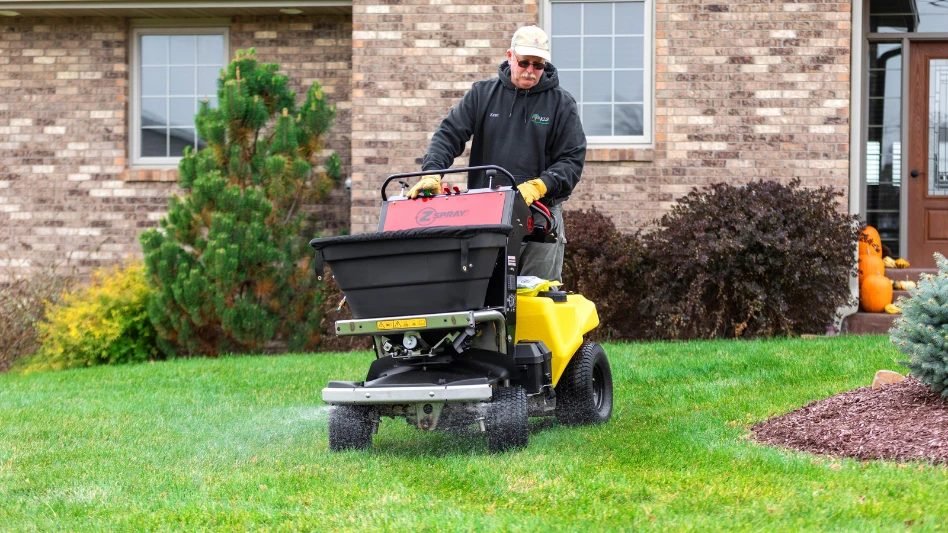

As a captain in the Tulsa Fire Department, Butch Dellis has to make quick, high-pressure decisions to lead firefighters safely through emergencies. But when he got serious about growing the supplemental lawn care business he tended to on his days off, Dellis faced a whole new challenge of knocking out figurative fires in the business world.
“You can’t equate growing a business to time-compressed decision making on a fire ground incident,” says Dellis, 47, who has been a firefighter for 21 years and owned his company for 19. “But there are definitely crossed paths when it comes to managing people and solving problems.”
Through decades of balancing a full-time firefighting career with his company, Nutri-Green Professional Lawn Services, Dellis developed systems to keep his crews operating smoothly while he was off fighting literal fires. By borrowing leadership lessons from the fire service, Dellis took a tactical approach to building Nutri-Green from a one-man side job into a million-dollar revenue machine – and growing.
“Training is one of the keys to our success. I have to instill processes that put everyone on the same page, because I have to be more hands-off (as an owner with another full-time career).” Butch Dellis, owner, Nutri-Green
Balancing act.
With a baby on the way in 1996, Dellis needed some additional income to supplement his engineering job. When his friend requested help mowing lawns around Tulsa, Dellis agreed to join him in the field after work.
After a couple years, Dellis sold his half of the small lawn business to his partner to pursue his dream of becoming a firefighter. After joining the Tulsa Fire Department in 1999, Dellis – who was still working as an engineering consultant on the side – realized how much he missed lawn care. He approached his old partner, who agreed to refer his mowing clients to Dellis for weed control and fertilization. In 2001, Dellis launched Nutri-Green with a steady flow of business.
For several years, Dellis juggled three jobs. His fire service schedule – revolving 24 hours on, then 48 hours off – allowed him to work other jobs on his days off. “I would go spray some accounts, and then I’d work as an independent engineering contractor, then I’d be at the fire station,” he says. “On my days off from the firehouse, I’d get up super early and start working on my commercial accounts (while it was) still dark outside.”
To supplement lawn care treatments for weed control and fertilization, Dellis took on any odd yard jobs clients requested, from cleaning gutters to trimming trees. After all, as a firefighter, he was comfortable climbing ladders. “Being honest with my customers (about my schedule) was key,” he says. “They knew I was a firefighter working on my days off.”
Dellis worked alone for several years, eventually bringing his sister-in-law to help in the office and his brother-in-law in the field around 2007. He finally eased out of engineering work, but kept Nutri-Green small while he focused on raising his daughters and pursuing fire service promotions.

From side hustle to grind.
While Nutri-Green provided “a nice side income” for his family, Dellis realized he was sitting on an untapped gold mine by keeping the company small. “There were a lot of jobs I wasn’t taking, so I knew I could generate some good revenue,” he says.
With limited promotional opportunities in the fire department and two growing daughters to support, Dellis decided to focus on growth – sparking the “rebirth” of Nutri-Green around 2012. “That transition period was tough,” he remembers. “I was juggling my time between knocking on doors, making calls, training and being in the field. It was very chaotic and stressful.”
To boost his growth strategy, Dellis began attending industry trade shows and networking with successful lawn care operators, who opened his mind to “more aggressive sales approaches, which created bigger spouts of growth,” he says. For example, Dellis learned about software and digital marketing strategies that could propel his company forward faster than just knocking doors and mailing postcards. Leveraging advice and classes from industry conferences, Dellis transitioned from manual estimates to an automated marketing database and started using social media to drive more referrals.
Dellis’ relentless “grind” of sales efforts generated more business as he added digital and mass marketing to his mix. “As I grew my customer base, it allowed me to hire people to do the fieldwork,” says Dellis, who relied heavily on Craigslist to find employees. “My aunt began managing the customer accounts, which (allowed me) to focus on selling. As something got bigger, I would bring in a new person to handle it.”
By gradually growing his team and delegating responsibilities, Dellis began tapping into new revenue potential as he expanded Nutri-Green’s market share.

University training.
Tactical training is a critical component of fire service and safety, with intensive assessments and problem-solving exercises to sharpen firefighting skills. It comes as no surprise, then, that training became vital as Dellis built his Nutri-Green team.
“Training is one of the keys to our success. I have to instill processes that put everyone on the same page, because I have to be more hands-off (as an owner with another full-time career),” says Dellis, who formalized a program called Nutri-Green University around 2015. “The extensive training that we do solves problems before they occur.”
Nutri-Green’s initial training is tailored around Oklahoma’s applicator technician certification, with hiring dates scheduled a few days before the Department of Agriculture offers the licensing exam twice a month. Nutri-Green sends study packets to new hires as soon as they accept a job offer, then they review the material during orientation.
After acing the state applicator exam in the morning – with a 100% pass rate – Nutri-Green employees begin field training that afternoon. “They’re assigned a trainer in the field for extensive training that covers everything from customer service to equipment,” says Dellis, including a half-day in the office where they’re exposed to administrative work.
For example, the equipment training module teaches employees how to safely and properly use, clean and calibrate spraying equipment to get consistent results. To put this training in action, Dellis sets up equipment obstacle courses – similar to the fire truck driving courses used by the fire department – with orange cones creating serpentine paths and narrow clearance zones that crews might encounter on customer properties.
As new hires float around to different route managers, trainers check their progress using checklists that indicate when each topic has been “introduced,” “in progress” and ultimately reached “satisfactory” understanding. This typically takes two or three weeks. At that point, the trainer steps back to observe while the new hire takes charge of the route for at least a week before going off on their own.
As a check-and-balance, Nutri-Green’s production manager evaluates performance through random property checks and monthly ride-a-longs for new and experienced employees alike. To keep employees sharp, Dellis also gives random pop quizzes about turf issues or customer service policies. For example, he might share a picture of a weed in the company’s Microsoft Teams chat room, and employees will send him private messages to identify it for a chance to win a small prize like a candy bar. Other times, he might hand out a small five-question quiz about weed control during the Wednesday morning team meeting, or call out individual employees to explain how they’d respond to certain customer service scenarios.
Crews also go through mandatory half-day training sessions before each of Nutri-Green’s seven annual weed control treatments, where they review the chemicals they’ll be spraying and the weeds they’re targeting. Vendor reps sometimes provide detailed presentations about common insects or diseases. To keep employees engaged, Dellis provides food, performance awards and even equipment competitions with his obstacle courses “to make it fun, break up the monotony and develop skills at the same time,” he says. “We’re trying to create an environment of learning where people keep striving to be better.”
Smooth operation.
Between two 24-hour shifts at the firehouse and 40 hours at his business, Dellis regularly swings 90-hour workweeks – but he can’t be everywhere at once. This balancing act demands that he puts processes in place to keep operations running smoothly at Nutri-Green while he’s fighting other fires.
“If you have good people and they understand and execute your policies,” Dellis says, “then good people can make great choices, so you have fewer problems.”
With no operations manager on his team, Dellis instead holds employees accountable to themselves and each other with an incentivized bonus system. Instead of basing salaries on hourly rates alone, Nutri-Green offers up to $20,000 a year in potential incentives that employees earn by hitting certain metrics related to service, production and quality.
For example, Nutri-Green tracks employees’ net promoter score (which measures their customers’ willingness to recommend their service) using an app called Podium that crews use to text customers a link to review them after each visit. To earn the quarterly NPS bonus, employees need an average score of at least 75.
To reward production, Nutri-Green incentivizes employees by paying 5% for every dollar of work they produce. Once they exceed $240,000 of production in a year, they earn an additional 3% bonus. While most incentives are individualized, the team can also earn an extra $50 each month if everyone meets their biweekly team production goals. Dellis says this promotes teamwork, where crews help each other to reach goals together.
Service call volume offers another potential bonus. By dividing each employee’s service calls by the number of production stops on their route, Dellis calculates a percentage of service calls per production to keep it fair regardless of route size. A service call rate of less than 2-3.5% in a month earns another $50.
“We put a lot of responsibility on our route managers. That’s why we call them route managers, not technicians, because they’re not just there to do a technical job; they’re there to take care of the customer’s needs,” Dellis says. “Since we moved to this system, I’ve had route managers tell me that they’re finding themselves slowing down in the lawn and making sure they’re more thorough.”
Growing success.
Extensive training, team goals and transparency keep Nutri-Green employees accountable, whether Dellis is in the office or at the firehouse. By implementing these systems, Dellis grew Nutri-Green from $152,000 in 2012, past the million-dollar mark in 2018 and is on pace to hit $1.4 million in 2020.
While Dellis admits that he’s missed out on some growth opportunities because half of his time is devoted to another career, he believes that his dual nature adds value to both ventures by honing his leadership skills.
“I found two careers that I’m very passionate about, and I love what I do,” he says. “There’s a commonality in the two professions that really resonates with me, and that’s being able to see other people be successful. In the roles I play as a captain and a business owner, I’m able to train, teach and develop people, and that’s the reward I get from this.”

Explore the November 2020 Issue
Check out more from this issue and find your next story to read.
Latest from Lawn & Landscape
- PERC helps debut propane direct-injection fuel system at ACT Expo 2025
- Retargeting Ads – A Secret Weapon for Growing Your Lawn Care Business
- Leading a growing company
- Project EverGreen launches Clean Air Calculator
- Rain Bird acquires smart lawn care company OtO from Toronto
- PBI-Gordon names Marvin as VP of research and development
- Mean Green rolls out Vanquish Autonomous mower
- Focal Pointe launches new podcast series





